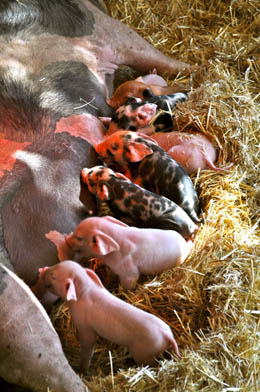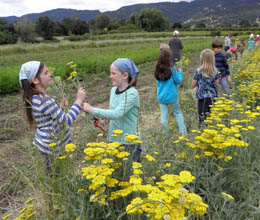Lifelong Farm Romance
- By Paul Muller
- Reading Time: 5 mins.
 Image courtesy of Full Belly Farm, Guinda CA
Image courtesy of Full Belly Farm, Guinda CA
By Paul Muller of Full Belly Farm, courtesy of Capay Valley Farm Shop
Sunday Mornings start the week in a relatively quiet and reflective time here at the belly. We can sleep in – usually about 7 am or so – start slow, sip rather than gulp a cup of coffee, and maybe engage in a moment or two of meaningful- non-work related- conversation. We have precious moments to savor the summer green of the farm or a ripe piece of fruit for breakfast. There are still, however, a few chores that tug at our sleeves. Animals need to be fed. Arnica (the current jersey cow milk source) needs her flake of hay and a little grain to produce her three gallons of creamy milk; Cookie, (our celebrity sow), needs grain, old vegetables, and an ear scratch as she readies her day of being a food fountain for her eight piglets; goats – Buckwheat, Cowgirl and Abigail (who had two new kids last week) – are in the maternity wing of the farm, a few pens behind the house, and will eat about anything that you are willing to give them; 1200 chickens need some scratch, a little oyster shell meal and some sprouted grains for their breakfast, lunch and dinner (and their eggs need collecting and cleaning, about 40 dozen per day)”¦ and the few other chores that make a finite set of tasks – checking sheep, taking a long walk around the farm, setting irrigation water for the day, or listening to the soft cooing of our collared doves. The tasks are different on Sundays because the pace is not driven by our great crew arriving at 6:30 am ready to pick, sort, disc, fix, break, sell, water, feed, mow, hoe, cultivate, milk, direct. In a relative sense, Sundays are the tranquil time before a weekly blur of activity.
You all probably know that we have a summer camp program that is in its second week. So this Sunday in 2012 is a beginning of Hallie’s week when, by 2 in the afternoon, we will have about 60 new campers, 15 counselors and a bunch of drop ’em-off parents who will make their teary goodbyes and head home for a week of quiet separation. The campers become farmers in training- planting seeds, pulling weeds, doing chores, coaxing milk from a cow’s udder, while playing banana tag, yamaquok, capture the flag, and farm jeopardy. They become a farm tribe, displaying their talents, mastering pizza construction, cooking, and consumption, harvesting their meals, and doting on the baby goats, dogs, and piglets. The campers are fully engaged in the farm, setting up tents in the walnut orchard while the daily work of the farm takes place all around them. They are introduced to the farm in a way that is meaningful and real. Their experience becomes the entry point for a lifelong memory while developing an awareness of the realities of farming, we hope the beginning of a lifelong farm romance.
 Image Courtesy of Full Belly Farm, Guinda, CA
Image Courtesy of Full Belly Farm, Guinda, CA
The seduction that leads to romance requires thought and active intention. We can set the environment that introduces youth to a wholly engaging sensory experience that is personal and real. I have always felt that the subtleties of growing new farmers require that the heart becomes engaged and attached to both a place and to the experiences that connect you to that place. The entry points are many: Picking, preparing and sharing good food; touching the soft nose of a goat; experiencing goaty character through the feel of its hair, particular smell or mischievous look of its eye; having the freedom to run, shout, work, climb, make, eat or play, and at the same time be responsible to others; slurping and savoring the complex sweetness of a ripe peach or melon; or having responsibility to both think things through and act upon your decision. The scale at which the seduction takes place is also critical, for the romance is fueled by both relationship and imagination. It is difficult to be affectionate with enterprises where the personal or intimate relationship is lost or incomprehensible because of scale.
Want farm-fresh fruit?
We've got you covered.
Wendell Berry writes about imagination in a beautiful essay called “It all Turns On Affection.” He writes, “Imagination thrives on contact or tangible connection. For humans to have a responsible relationship to the world, they must imagine their places in it. To have a place, to live and belong in a place, to live from a place without destroying it, we must imagine it. By imagination we see it illuminated by its own unique character and by our love for it. By imagination we recognize with sympathy the fellow members, human and non-human with whom we share our place”¦ As imagination enables sympathy, sympathy enables affection. And it is in affection that we find the possibility of a neighborly, kind and conserving economy.”
There are folks who dismiss the potentials of healthy agrarian economies as ”˜romantic’ and say that romance isn’t possible in our serious world. We invite a little more imagination. The impending challenge of a planet of 9 billion people by 2050 will require that we tenure land with affection. We will need to make fair returns for the many rural producers/small farmers so that they might not only feed themselves but the many around them. It will require that we consider supporting and promulgating the place-based stewardship and potentials of making small farms places of productivity, beauty, and affection.
To solve for pattern in a growing world and feed the many to come, we must imagine another possibility than the paradigm of the present US system where the few feed the many who are located in urban areas. Think of making prosperous lives where the multitudes born in rural areas will become productive and richer in the lives they lead in places with which they are intimate. Successes and viable livelihoods kindle possibilities and fuel imagination. On this Sunday morning, with so many shouting young sweet voices outside the back door mixing with the cooing of a collared dove, the world is full of possibilities. Romance is in the air.


